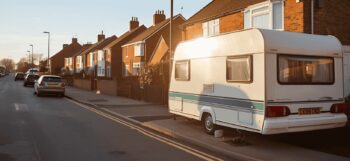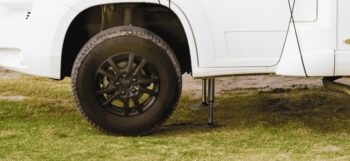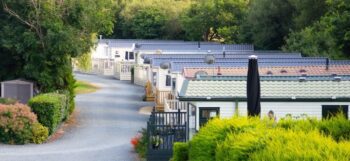Your caravan’s electrics power everything from your lights and fridge to your heating and water pump, so it’s worth getting to grips with how it all works.
Caravan electrics aren’t one-size-fits-all. Touring caravans use a mix of 12V battery power and 240V mains electricity, meaning they can function both on and off-grid. Static caravans rely entirely on 240V mains power—just like a house. Knowing the difference can help you avoid issues.
In this guide, we’ll break down the basics of your touring caravan’s electrical system, the key components that keep it running, and some essential safety tips to help you stay powered up and problem-free.
How your caravan’s electrical systems work
Your caravan has two types of electrical systems, with each powering different appliances:
12V electrical system
Power source: A leisure battery, which stores power for off-grid use
What it powers: LED lighting, water pumps, heating control panels, USB chargers, 12V sockets (for phone chargers and other small devices)
How it’s charged:
• Mains hookup (when available)
• Solar panels (if installed)
• Engine alternator (when driving)
240V mains electrical system
Power source: A mains hookup cable, which provides power when connected at a campsite.
What it powers: Kettles, microwaves, coffee machines, air conditioning units, fridges and freezers (when switched from gas mode), televisions and entertainment systems.
What happens off-grid?
These appliances won’t work unless you use an inverter, which converts 12V battery power to 240V (though this drains batteries quickly).
Key electrical components
- Leisure batteries: Provide 12V power for essential appliances.
- Mains hookups: Provide a direct 240V connection at campsites.
Inverters: Convert 12V battery power into 240V mains power for off-grid use.

The main electrical components in a caravan
There are three main electrical components that can power a caravan—leisure batteries, solar panels and a mains hookup. They all work differently and have their own pros and cons.
Leisure batteries
A leisure battery provides power when you're off-grid and not connected to mains electricity. Unlike the mains supply, which powers larger appliances, the leisure battery provides 12V power to smaller devices like low-voltage lighting and 12V TVs.
It’s ideal for short trips or when you’re not yet at a campsite with a mains hookup. While it can’t power larger items like fridges or hairdryers, it helps keep the essentials running, ensuring your caravan stays functional on the go.
Discover more about caravan leisure batteries in our dedicated guide.
Solar panels
Solar panels are a great way to make your caravan even more self-sufficient, especially when you're off the beaten track. These panels capture sunlight and convert it into electricity, which can be used to charge leisure batteries or power low-voltage appliances.
Solar power can help reduce your reliance on mains hookups, keeping your lights, small appliances, and devices powered throughout the day without using up your leisure battery. It’s an eco-friendly and cost-effective option for long-term caravan stays.
Discover more about caravan solar panels in our dedicated guide.
Mains hookups
Mains hookups are what you’ll rely on when staying at a campsite or caravan park with full electrical amenities. These connections provide 240V electricity, which powers larger appliances like fridges, kettles, and heating systems.
Unlike leisure batteries, mains hookups allow you to run multiple high-wattage items simultaneously. This makes them ideal for long stays where you need all the comforts of home. Just plug in, and you’ll have the power to enjoy your caravan without limitations.
Tips to safely use your caravan electrics
From de-tangling cables to carbon monoxide monitoring, there are many things to check to ensure electrical safety in your caravan:
• Inspect for damage: Regularly check cables, plugs, and sockets for cracks, fraying, or exposed wires. Replace any damaged components immediately.
• Prevent overloading: Avoid overloading the mains system or multi-adapters. If an appliance stops working, switch off the power before inspecting it.
• Use the correct cables: Ensure you’re using the right cables for each appliance and avoid relying on extension leads.
• Fully unwind cables: When connecting your caravan to a site hookup, fully unwind the cable and lay any excess in parallel rows rather than coiling it tightly.
• Avoid faulty appliances: Damaged or malfunctioning appliances can cause short circuits and arcing, increasing the risk of fire.
• Schedule professional inspections: Arrange a fixed wire and EET (PAT) test with a qualified professional at least every three years.
• Install a carbon monoxide detector: Ensure your caravan has a working carbon monoxide detector and test the batteries regularly. Keep vents clear and maintain proper ventilation.
• Watch for overheating: Check for signs of overheating or burning on plugs and sockets. Never use an outlet that feels hot.
• Be cautious of short circuits: Short circuits can occur when live and neutral wires touch—be aware of potential wiring faults.
• Understand arcing risks: Arcing happens when electricity jumps between conductors, posing a serious fire hazard.
If you’re ever unsure about an electrical problem, don’t try to fix it yourself. Electricity can be dangerous and getting it wrong could lead to serious damage or injury. A qualified professional can diagnose issues safely and keep everything in good working order.

Tips if you take a trip off-grid
Planning a road trip? Here are some tips to keep your electrics running efficiently while you’re off-grid:
- Monitor battery levels: Check your leisure battery’s charge and top it up when possible. Consider carrying a portable battery charger or investing in a second battery for backup.
- Use power wisely: Reduce unnecessary power usage by switching off appliances when not in use. LED lights, energy-efficient appliances, and gas-powered alternatives can help conserve battery life.
- Solar power can help: A solar panel setup can provide a steady trickle charge to your battery, extending its lifespan and reducing reliance on generators.
- Optimise appliance efficiency: Stick to 12V appliances where possible, as they’re designed to run efficiently on leisure battery power.
- Be mindful of heating and cooling: Gas-powered heaters and fridges are great alternatives to electric models when off-grid. If you must use electric appliances, run them only when necessary.
- Plan for recharging opportunities: If you’re on an extended trip, consider stopping at campsites with electric hookups occasionally to recharge your battery.
Common caravan electrical issues
An electrical issue can strike without warning, whether you’re connected to mains power or running off-grid. Below are some ways to fix common faults:
- Loss of power: If your caravan suddenly loses power, check whether your battery is charged or if your mains hookup is properly connected. If using mains, test another power source to rule out a campsite issue.
- Tripped circuit breakers: If your caravan has power issues, check the consumer unit for a tripped breaker. Reset it if necessary, but if it trips repeatedly, you may have a faulty appliance or an overload.
- Overloading the system: Running too many high-wattage appliances at once can overload your electrical system. Be mindful of power consumption, especially when using hairdryers, kettles, or heaters.
- Faulty connections: Loose or corroded wiring can cause intermittent power issues. Inspect connections for any visible damage, but it’s a good idea to consider professional help if you need electrical repair.
- 12V battery draining too quickly: If your leisure battery isn’t holding a charge, it may be reaching the end of its lifespan or not being recharged effectively. Check for excessive power drain from appliances and ensure solar panels or chargers are working properly.
- Internet goes down: If your caravan’s Wi-Fi or mobile hotspot stops working, check if the router or signal booster is properly powered and positioned. If using a mobile data connection, try moving to an area with better coverage. For further guidance, read our guide on how to use the internet in your caravan or motorhome.
- Watching television: If your caravan TV isn’t working, ensure it’s connected to a reliable power source and that the aerial or satellite dish is properly aligned. If using a 12V TV, check that your leisure battery has enough charge.
Get in touch with Lifesure to protect your caravan
Although we’ve taken you through the ins and outs of caravan electrics, we understand getting to grips with it all can still be daunting—especially when there’s always a risk you could face a problem. Remember, if you’re ever unsure about an electrical problem, don’t try to fix it yourself, please consult a professional.
To give you extra peace of mind, we offer specialist touring caravan insurance and static caravan insurance to cover you should you run into an electrical issue. Plus, we offer RAC breakdown cover for extra protection while you’re on the road.
Disclaimer: The sole purpose of this article is to provide guidance on the issues covered. This article is not intended to give legal advice, and, accordingly, it should not be relied upon. It should not be regarded as a comprehensive statement of the law and/or market practice in this area. We make no claims as to the completeness or accuracy of the information contained herein or in the links which were live at the date of publication. You should not act upon (or should refrain from acting upon) information in this publication without first seeking specific legal and/or specialist advice. Arthur J. Gallagher Insurance Brokers Limited trading as Lifesure accepts no liability for any inaccuracy, omission or mistake in this publication, nor will we be responsible for any loss which may be suffered as a result of any person relying on the information contained herein.
FP178-2025











